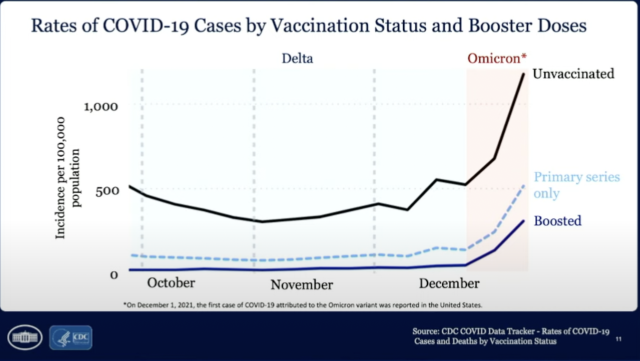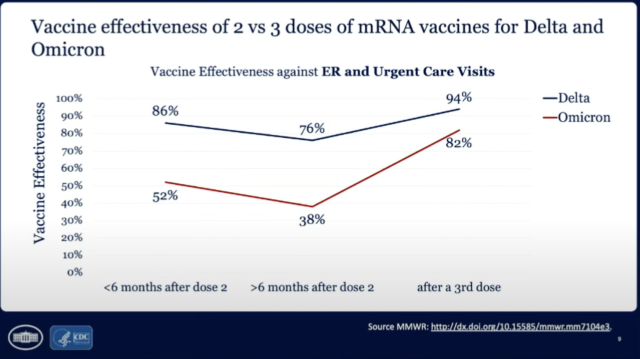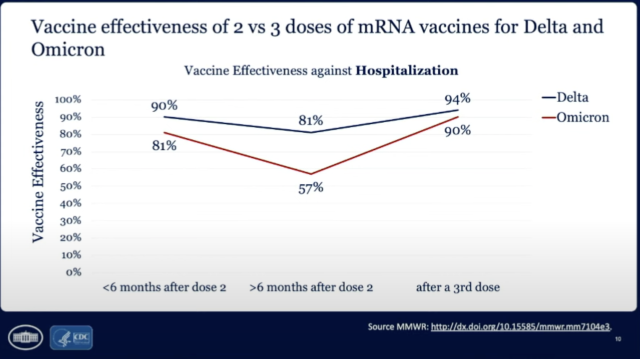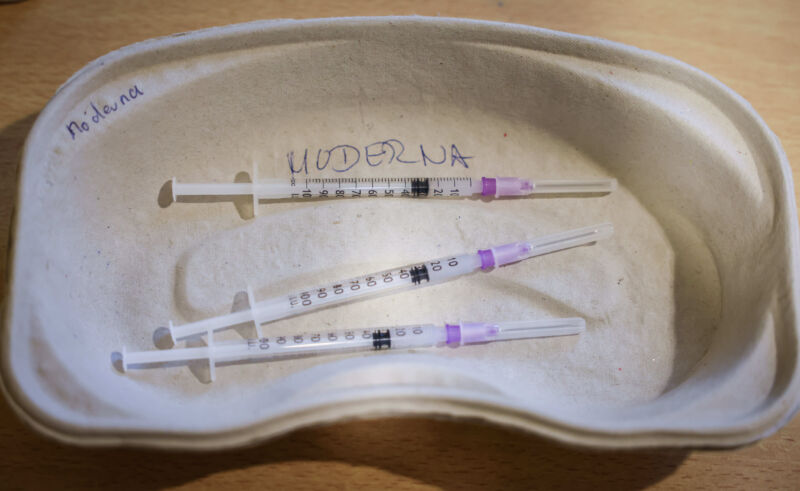Amid the stratospheric rise of the omicron variant, real-world data on the effectiveness of COVID-19 booster doses is now rolling in—and it is only looking up for boosters.
The Centers for Disease Control and Prevention reported three studies Friday, two published in the CDC's Morbidity and Mortality Weekly Report (MMWR) and another, appearing in JAMA, by CDC scientists.
One of the MMWR studies looked at the vaccination status of nearly 10 million COVID-19 cases from 25 state and local health departments. CDC scientists and health officials compared weekly rates of COVID-19 infections between unvaccinated people, fully vaccinated people, and fully vaccinated people who were also boosted. In the month of December, as cases of the ultra-transmissible omicron variant skyrocketed, unvaccinated people were nearly three times more likely to report a case of COVID-19 than people fully vaccinated. Compared with fully vaccinated and boosted people, the unvaccinated were five times more likely to report a case.
The study in JAMA supported this finding. In that work, CDC scientists looked at nationwide pharmacy-based COVID-19 test results collected in December from around 70,000 people whose vaccination status was known. The analysis concluded that omicron infections were significantly less likely to occur in fully vaccinated and boosted people than in both the unvaccinated and fully vaccinated.
Still, both studies noted a drop in vaccine effectiveness against omicron compared with the previously dominant coronavirus variant, delta. In the MMWR study, researchers looked at cases reported from October to November, when delta was raging. They found that unvaccinated people were four times more likely to be infected with delta late in the year than fully vaccinated people and nearly 14 times more likely to get a delta infection than fully vaccinated and boosted people.

But in the second MMWR study, CDC scientists found that booster doses do appear to restore protection against serious disease and hospitalization back to delta-era levels. The study was a multi-state analysis looking at nearly 223,000 patient visits to either emergency rooms or urgent care centers for COVID-19, as well as nearly 88,000 hospitalizations, all between last August and earlier this month.
Amid delta, the effectiveness of two doses against emergency room and urgent care visits started out at around 86 percent, fell to about 76 percent as people reached beyond six months after their second vaccination, and was pushed back up to 94 percent after a booster dose. With omicron, two-dose effectiveness against emergency room and urgent care visits started out at a dismal 52 percent, fell to 38 percent with waning protection, and was boosted back to 82 percent after a booster.

For hospitalizations caused by the delta variant, the effectiveness of two doses started at around 90 percent, fell to 81 percent amid waning protection, and rose to 94 percent after a booster. Against hospitalizations caused by omicron, two-dose effectiveness started at 81 percent, fell to 57 percent with waning, and rose to 90 percent after a booster.

"Taken together, these data highlight two important points," CDC Director Rochelle Walensky said in a White House Press briefing Friday. "First, those who remain unvaccinated are at significantly higher risk for infection and severe COVID-19 disease. Second, protection against infection and hospitalization with the omicron variant is highest for those who are up to date with their vaccination, meaning those who are boosted when they are eligible."
Only 63 percent of the US population is fully vaccinated, and tens of millions of people who are eligible for a booster have not gotten one. "I urge all who are eligible to get their booster shot to get it as soon as possible," Walensky said.



3175x175(CURRENT).thumb.jpg.b05acc060982b36f5891ba728e6d953c.jpg)


Recommended Comments
There are no comments to display.
Join the conversation
You can post now and register later. If you have an account, sign in now to post with your account.
Note: Your post will require moderator approval before it will be visible.